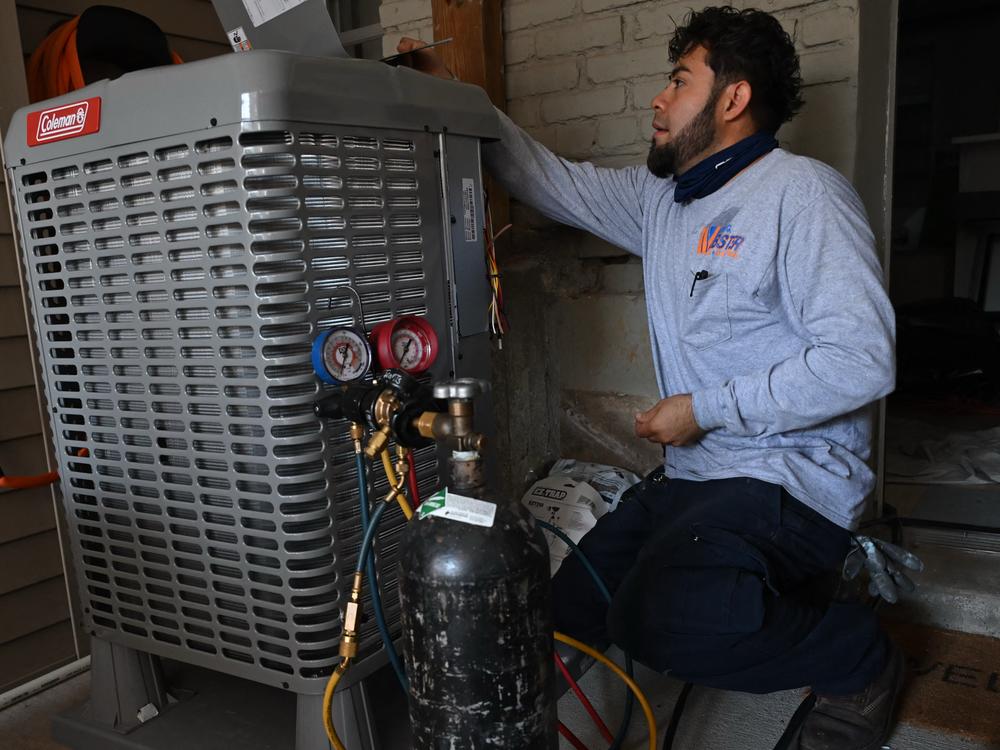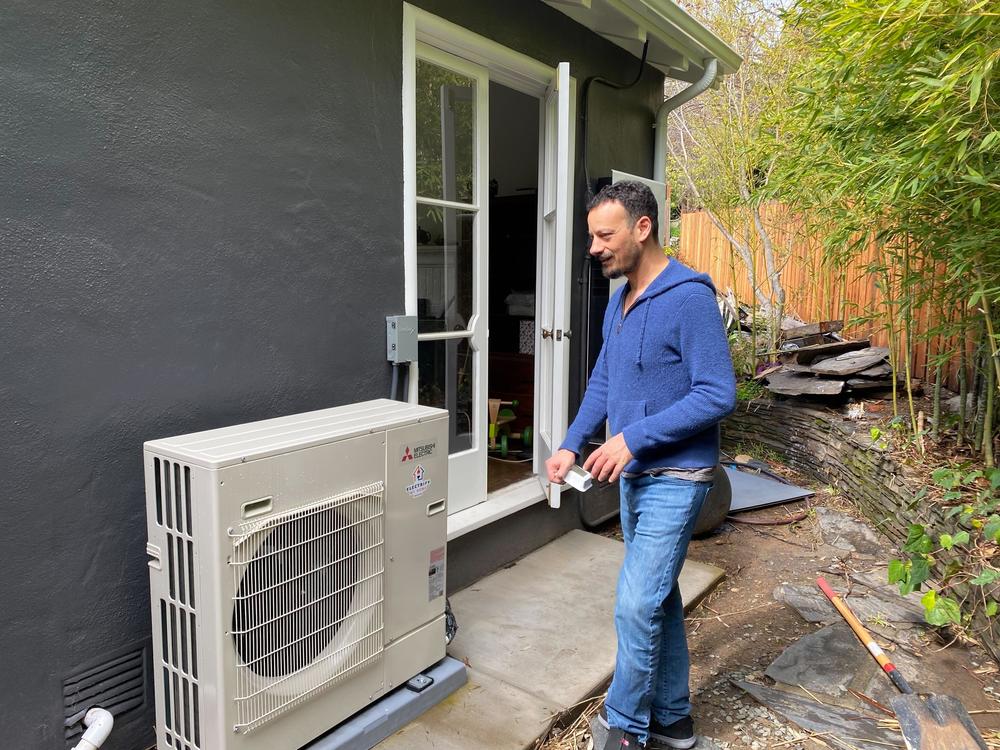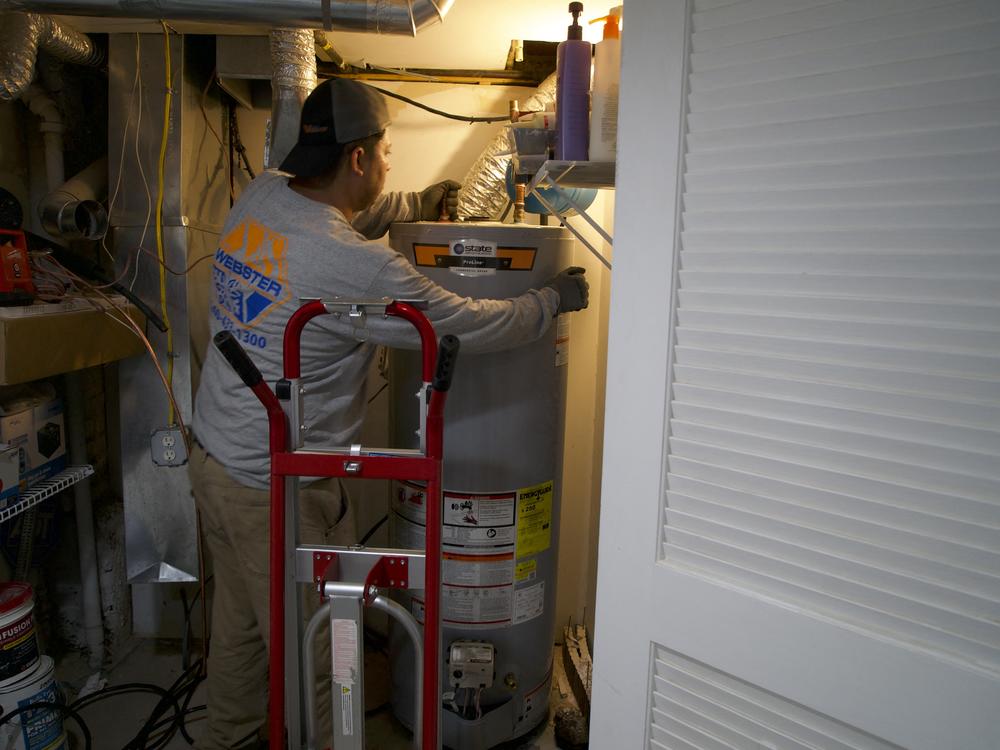Section Branding
Header Content
Want government money for a heat pump? Time might be running out
Primary Content
Heat pumps are electric appliances that can both heat and cool your home.
Scientists see them as a climate solution because heat pumps reduce planet-heating emissions. They cut pollution from burning gas for heating, and reduce the use of gas infrastructure that leaks planet-heating methane gas.
And heat pumps are highly efficient, which means less electricity is needed to use them than traditional heating systems like fossil fuel furnaces and boilers. Researchers at the Department of Energy's National Renewable Energy Laboratory calculate that 62% to 95% of households would save money by switching to a heat pump. " It's an enormous amount of savings," says Ari Matusiak, CEO of the nonprofit, Rewiring America. "That's just a fact of the technology being superior."
The Biden administration's 2022 climate legislation introduced new federal tax incentives of up to $2,000 for heat pump equipment and installation costs. Many states as well as cities and utilities offer additional financial incentives.
So what money is available right now for a prospective heat pump buyer? And how might a second Trump administration and a Republican-controlled Congress impact this money?
Here are the answers to your heat pump and money questions.
Before we get to money, remind me, how do heat pumps work?
Heat pumps are "basically this magical two-in-one device," Matusiak says.
For cooling, heat pumps work like air conditioners. They run on electricity and use refrigerants. For heating, heat pumps also use refrigerants. The refrigerants absorb bits of heat from outdoor air and bring them inside to warm up a home.
Some types of heat pumps are specifically designed for extra cold climates, and heat pump sales are booming in countries like Norway, Finland and Sweden.
What kind of money can I currently get from the federal government to buy a heat pump?
The U.S. federal government is currently offering up to $2,000 for homeowners buying heat pumps. The money comes in the form of a tax credit, which lowers your final tax bill, says Steven Nadel, executive director of the American Council for an Energy-Efficient Economy, a research organization working on saving energy.
Nadel notes not all heat pumps are eligible for the federal tax credit. The heat pump has to have a high efficiency rating from the Consortium for Energy Efficiency, a nonprofit. Some manufacturer websites list tax credit-eligible equipment, as does the ENERGY STAR Product Finder. Nadel says to check the Department of Energy's website to see which heat pumps qualify for federal tax credits.
What about states, cities, and my local utility? Can I get money from them?
Many homeowners can get additional money for heat pumps from their local utility, state, or city. Some states, cities and utilities have incentive programs they pay for themselves. There's some additional money for states from the federal government and the 2022 national climate legislation.
Some states offer heat pump money as tax credits. Some money comes in the form of "point of sale" rebates. That means the money comes off the top of the price of equipment or installation. Utilities often offer post-purchase rebates.
Rewiring America and another nonprofit called The Switch is On have online tools that use people's zip codes and income to search for which federal, state, local, and utility incentives consumers qualify for. Nadel encourages prospective buyers to check in with their local utility to see if it offers additional money.
I'm a renter and want to buy a heat pump. Can I get money too?
More than a third of Americans rent. While some renters are not in a position to, say, swap out their homeowner's furnace, some renters with flexibility might be interested in a portable heat pump. Portable heat pumps can go into a window much like a window air conditioning unit and plug into the wall for power.
Matusiak says window heat pumps may soon be eligible for more of these rebate programs, so he encourages prospective buyers to also check out Rewiring America's online tool.
What do the incoming Trump administration and a Republican-controlled Congress mean for current heat pump incentives?
Shuting Pomerleau, director of energy and environmental policy at the American Action Forum, a conservative think tank, is not optimistic about the future of federal heat pump money. " Those incentives, whether they're tax credits or, rebate programs are likely to go away under the upcoming Republican trifecta," Pomerleau says.
The incoming Republican-led congress will be looking for revenue to pay for tax cuts, says Diana Furchtgott-Roth, director of the center for energy, climate, and environment at the Heritage Foundation, a conservative think tank based in Washington. They will likely get rid of spending programs from Biden's 2022 climate legislation, she says, including the tax credits for heat pumps.
The Trump transition team did not respond to NPR's request for comment.
Pomerleau notes that while federal heat pump money is at risk of drying up, some states may choose to continue their incentive programs using other money.
Matusiak says that heat pump rebate programs have been popular in red and purple states as well as blue states. He notes that after the election, states including Texas, Nebraska, Louisiana, Missouri, Kansas, Kentucky and Ohio applied for federal money for their heat pump rebate programs.
So if I'm thinking about getting a heat pump, does it make sense to get one sooner rather than later?
Nadel and Matusiak say before you rush out and buy a heat pump, think about what you already have in your home and how well it's working.
"If you have a perfectly functioning furnace that you bought two years ago, you shouldn't go get rid of it," Matusiak says.
But if it starts to die, he says, then buy a heat pump.
Pomerleau says it may make sense to buy that heat pump sooner rather than later to be sure to access federal money. She thinks it will take Republicans some time to make changes to the tax code, but she suggests buying a new heat pump before the end of the 2025 calendar year to be more sure of qualifying for a federal tax credit.



